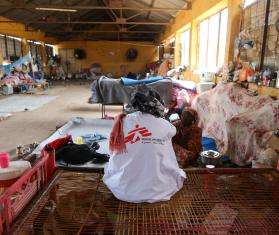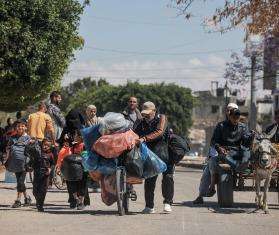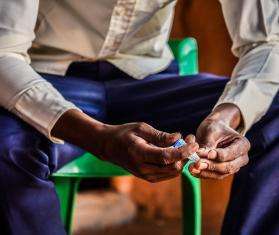NEW YORK/DELHI, APRIL 23, 2021—The international medical humanitarian organization Doctors Without Borders/Médecins Sans Frontières (MSF) is restarting its emergency response today in India amid a surging second wave of COVID-19 in Mumbai in Maharashtra state. The city is very densely populated, and poor hygiene conditions in parts of the city could lead to a rapid spread of the virus if more isn’t done to prevent transmission and treat people who have fallen ill.
New coronavirus infections across the country have reached more than 300,000 cases in a single day—a global record—with 115,736 daily new cases of COVID-19 reported in Maharashtra state alone on April 16. MSF teams are supporting case identification and management, and prevention activities in Mumbai.
“The situation is very worrying,” said Dilip Bhaskaran, COVID-19 coordinator for MSF in Mumbai. “This is the largest upsurge since the pandemic started. MSF stands ready to further pace up its services in support of the health facilities that are currently completely overwhelmed.”
MSF is supporting Shatabdi Hospital’s screening and triage IPC practices to prevent and identify cases of COVID-19—including among people with tuberculosis (TB) and drug-resistant tuberculosis (DR-TB) who have weakened immune systems and are more susceptible to contracting other diseases like COVID-19. MSF is carrying out these same activities at its own TB clinic in Maharashtra state.
Patients at Shatabdi Hospital and MSF's clinic who are co-infected with COVID-19 and tuberculosis are being referred for inpatient management and treatment to Sewri Hospital. Non-TB identified patients with COVID-19 that need admission are referred to Dedicated COVID-19 Health Center (DCHC) facilities. Additionally, MSF is providing prevention kits, counseling, and phone follow-ups to high-risk patients, including people with TB and DR-TB and diabetes patients, as well as the elderly.
As of last week, MSF started digital health promotion and water and sanitation activities in the informal settlements in M-East Ward (MEW) of Mumbai to ensure continuity of care in the four general health centers MSF already supports in the MEW settlements. These activities are expected to be extended to five more health facilities.
MSF is also preparing to support two units within a large field hospital set up to respond to the COVID-19 crisis in Mumbai and has recruited five additional medical doctors and five nurses to strengthen the response. The units will include two sets of tents with about 1,000 intensive care unit bed capacity in each. MSF will provide medical and technical support with oxygen supplies and therapy at this facility, where the MSF team will be taking care of critically ill patients in the intensive care unit.
MSF has been working in India since 1999, providing free-of-charge essential healthcare in Andhra Pradesh, Bihar, Chhattisgarh, Delhi, Jammu & Kashmir, Jharkhand, Maharashtra, Manipur, Telangana, and Uttar Pradesh. Earlier in the pandemic, MSF ran a 100-bed temporary treatment center for COVID-19 patients in Patna, the capital of Bihar state in the northeast of the country.
COVID in India: MSF resumes emergency COVID-19 activities in response to second wave

India 2020 © Abhinav Chatterjee/MSF



